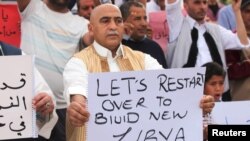The odds of a unity government taking hold in Libya got smaller Wednesday when the rival Tripoli-based administration backed down from its promise to give up power.
The National Salvation Government ordered security forces to stay on the job and continue protecting the administration. It also said it would hold the new unity government responsible for any violations of its security.
Tripoli-based authorities said Tuesday that they were disbanding their government and that its prime minister, parliament and ministry chiefs were all stepping down. But it said a day later that the new U.N-brokered unity government violated Libyan sovereignty.
"The choice of the new government is a purely internal national affair in which no one has the right to interfere," it said in a statement.
But the Tripoli administration also said it was committed to ensuring peace and preventing bloodshed. It said it would work toward a comprehensive political agreement that gives "legitimacy" to a Libyan government.
There was no immediate reaction from the U.N., which put together the deal for a Libyan unity government that the United States and Europe hope can bring the country together and successfully enter the fight against Islamic State militants.
Libya has been split between two governments — the pro-Islamic administration that took over in Tripoli and what had been the internationally recognized government that fled to Tobruk.
Tobruk authorities also have refused to recognize the unity government.
Libya has been in chaos since longtime dictator Moammar Gahdafi was toppled and killed in 2011. Rival armed factions have spent the last five years trying to grab power and take control of Libya's oil industry.
The turmoil has opened the door to extremists, such as Islamic State, to grab territory. The fight for oil fields and refineries has led to devastating fires and damage and has destroyed the Libyan economy.

